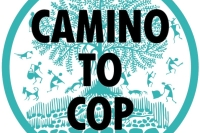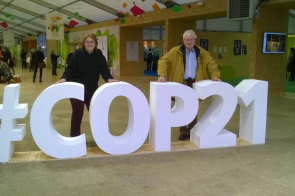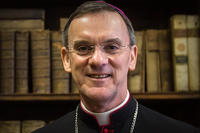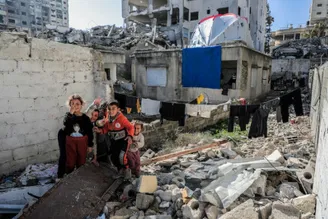Paris Blog 9: What does 'ecological conversion' look like?
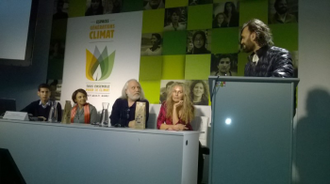
International panel
What does 'ecological conversion' look like? It's an important question for Catholics in the light of Laudato Si', the environment papal encyclical. During my last visit today to the venue of the UN Climate conference - COP21 - it was on my mind, particularly since the conference focus is turning very specifically to action responses to climate change.
Along with hundreds of others I treaded the well-worn path to the 'Climate Generations Area', a massive space for exhibitions and meetings which is open to the public for the duration of COP21, free of charge and right next door to the main conference hall. Once through security, where I had to drink again from my water bottle, I headed straight to the information desk to find out about the meetings today and select from them. I had my schedule within 10 minutes and sought out the first venue with anticipation, passing the Wangari Maathai room; clearly a tribute to the great African environmentalist who was educated by Catholic nuns in Kenya and the US, before she became famous globally for founding the Greenbelt Movement in Kenya.
After the first few hours had gone by I had learnt all about civic resilience in the South Pacific nation of Vanuatu despite the destruction of severe weather, watched explorers crossing ice on film and then appearing in person to stress the importance of raising awareness about the fragility of Antarctica, and attended a gathering on "Ecological and Energy Transitions financed by Citizens through Crowdfunding".
Just in case some of you don't know what the last means - in fact I didn't know, and I only went into it because the 'Oceans - Proposals for Blue Economy' meeting was full, with a Cousteau speaking - I'll explain. Crowdfunding is the funding of a project by raising financial contributions from a local community, and sometimes through the internet. All the speakers were French and spoke about windfarm projects in the Loire Valley and in Picardy. The first cost 750,000 euros which was raised by 350 local residents, and the second was 110,000 euros which several hundred contributors funded. It was easy to get people involved when they realised that ultimately their energy bills would be reduced, but many wanted to support renewable energy initiatives in their locality. We heard that 50% of Germany's renewable energy is produced by cooperatives. "Even if you are not interested in energy transition and the issue of climate change, you might be very interested in local economic development and cheaper energy" said a speaker. She added that, "many people these days like to know what their money is being used for".
After a coffee break, where people around me were discussing the value of soil and comparing how many 'shares' they had of their tweets from COP21, I set off for another batch of meetings. This might not be everyone's idea of a fun Saturday but it is certainly mine. I eagerly sought out my translation device to hear the Mayor of Seoul in South Korea speak to the title of "Seoul's moves towards Energy Democracy" in a meeting organised by Korea Climate Action. Mayor Won-Soon Pak explained that Seoul's use of solar panels has increased four-fold since 2011, and 2016 will see the growth of solar panels on the rooftops of schools. This energy transition is alongside an energy saving plan which has reduced Seoul's consumption of power by 4% despite an increasing population. He was delighted that one nuclear plant has been closed and is targeting two more for closure within the next few years. "We want safe people and a safe future" he said, "and more green jobs". He suggested that with well over half the world's population living in cities, "Earth is already a great coalition of cities, and cities and their citizens carry a huge responsibility to address the pain of the Earth". Pope Francis in Laudato Si' talks about listening to the cry of the Earth, and the mayor's words resonated.
I heard more resonances in a meeting, organised by World YMCA, about how campaigners and civil society can address climate change. A Norwegian negotiator to COP21 left the main conference - or in his words, "escaped from that fortress" - to underline the importance of knowledge in lobbying work. He would become impatient when lobbyists hadn't done their research - perhaps urging him to support a campaign that he already supported, or presuming that he would be against serious climate action because he is a politician. "Use social media to keep informed and to grow climate campaigning" was a key message to youth climate activists. Another speaker urged humility because "we are all climate deniers to some extent", in that few of us have reduced our own carbon footprints to keep climate change below the 1.5 degrees bar set by scientists. He suggested that an individual transition to a low carbon lifestyle is as important as urging changes at the macro level.... again echoes of "ecological conversion".
But "ecological conversion" is at heart a spiritual response to the climate crisis. While there was no specific Christian meeting today - and it is a shame that a 'Laudato Si' meeting at the conference earlier in the week was cancelled - I did discover the need for "moral and cosmic balance" in a meeting titled, 'Dharma and Climate Change'. It was run by an Indian climate scientist who felt there "is not much of a moral angle" in top down processes. In order to show that ordinary people can play a significant role in the transformation of society in the light of climate change, he invited four members of the audience to fill the empty seats on the platform and comprise the panel. The four - from Sri Lanka, South Africa, Canada and US - certainly kept us engaged. "My country is a cesspool of climate deniers" said the man from the US, "and I want to learn about responses and best practices in other parts of the world". The woman from South Africa wanted to see climate change recognised as a moral issue, especially with recent droughts and heatwaves in her country, but also felt that immediate needs for housing and employment competed for attention. Our Indian chair was concerned that acting on climate change and promoting the UN's Sustainable Development Goals is backburner for an India, "that is trying to pump up consumerism".
So much came back to consumerism and consumption beyond Earth's finite resources, alongside magnificent practical initiatives to get back to working with life systems and not against them. As one speaker put it, "society is currently based on having and not being". Perhaps "ecological conversion" could begin by us reflecting on what this means for us as individuals and as Christian community.



